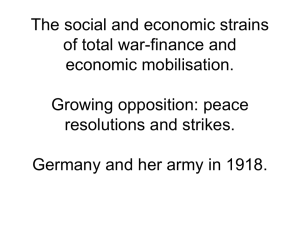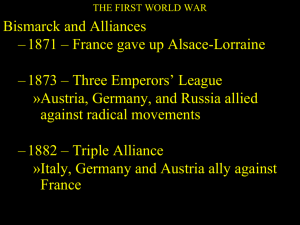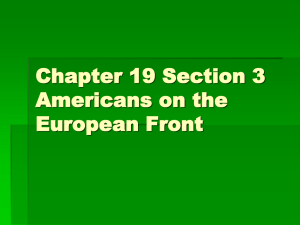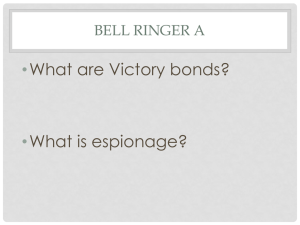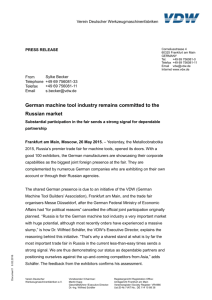(3) Document 2
advertisement
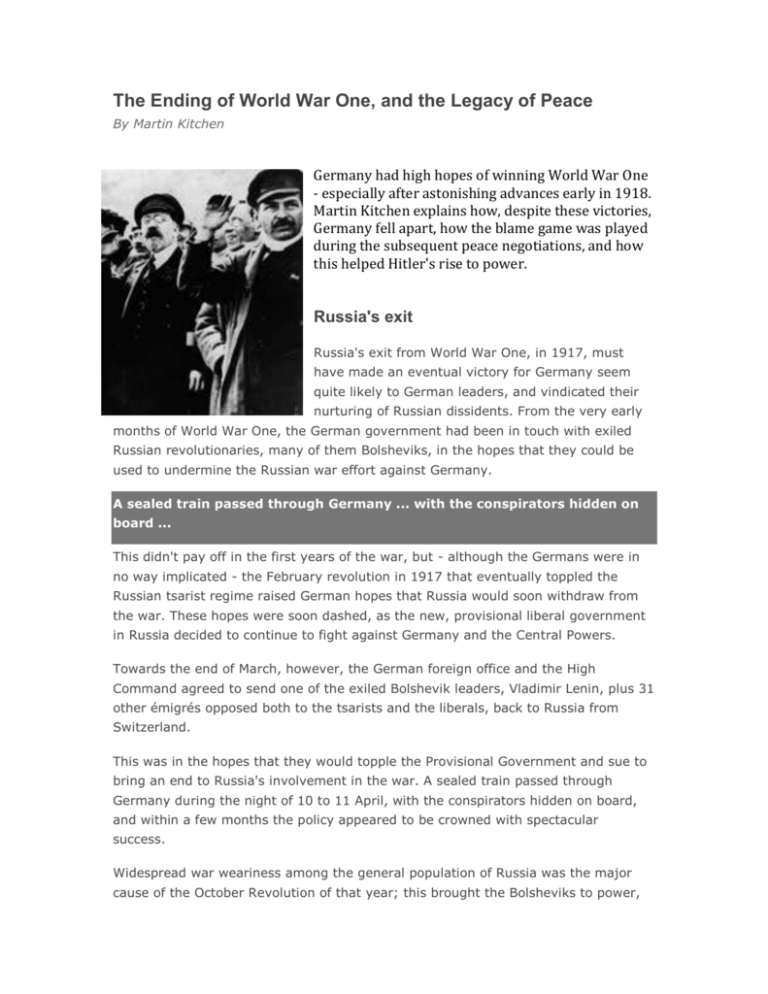
The Ending of World War One, and the Legacy of Peace By Martin Kitchen Germany had high hopes of winning World War One - especially after astonishing advances early in 1918. Martin Kitchen explains how, despite these victories, Germany fell apart, how the blame game was played during the subsequent peace negotiations, and how this helped Hitler's rise to power. Russia's exit Russia's exit from World War One, in 1917, must have made an eventual victory for Germany seem quite likely to German leaders, and vindicated their nurturing of Russian dissidents. From the very early months of World War One, the German government had been in touch with exiled Russian revolutionaries, many of them Bolsheviks, in the hopes that they could be used to undermine the Russian war effort against Germany. A sealed train passed through Germany ... with the conspirators hidden on board ... This didn't pay off in the first years of the war, but - although the Germans were in no way implicated - the February revolution in 1917 that eventually toppled the Russian tsarist regime raised German hopes that Russia would soon withdraw from the war. These hopes were soon dashed, as the new, provisional liberal government in Russia decided to continue to fight against Germany and the Central Powers. Towards the end of March, however, the German foreign office and the High Command agreed to send one of the exiled Bolshevik leaders, Vladimir Lenin, plus 31 other émigrés opposed both to the tsarists and the liberals, back to Russia from Switzerland. This was in the hopes that they would topple the Provisional Government and sue to bring an end to Russia's involvement in the war. A sealed train passed through Germany during the night of 10 to 11 April, with the conspirators hidden on board, and within a few months the policy appeared to be crowned with spectacular success. Widespread war weariness among the general population of Russia was the major cause of the October Revolution of that year; this brought the Bolsheviks to power, and almost the first act of the new government was to publish its peace proposals on 8 November. The fighting on the Eastern Front ended within a few weeks, and a peace conference began its deliberations at Brest Litovsk on 22 December 1917. The negotiations were lengthy and fractious and it was not until 3 March 1918 that the instruments were finally signed. Russia lost control of the Baltic States, Poland, Finland, the East Anatolian provinces, and the districts of Erdehan, Kars and Batum. Ukraine became a theoretically independent state under German military occupation. Russia lost about one million square kilometers, and 50 million inhabitants, in a treaty negotiated on the theoretical basis of a peace without annexations and reparations. Knock-on effect A member of the Irish Fusiliers on the Western Front, 1917 ©At first it seemed that Germany had won a significant victory. Russia was out of the war and the High Command had realised its annexationist ambitions in the east. But the treaty also caused a number of serious problems. The lengthy deliberations seriously disrupted planning for the German spring offensive that was to begin on 21 March 1918. Over one million men were still in the east to enforce the treaty and to occupy the Ukraine. These forces were badly needed on the Western Front, and the disruption of agriculture due to war and civil war meant that they were able to extract precious little in the way of additional foodstuffs from the former Russian Empire to overcome the shortages at home. The German Army made astonishing advances in the first few days of the offensive ... Most serious of all, although very few of the German and allied troops were attracted to Communism, the Bolshevik appeal for an end to the war met with a powerful resonance and was the direct cause of a wave of strikes beginning in Vienna in January 1918 and spreading to Germany. Despite these problems, and although a number of senior commanders were exceedingly sceptical about the chances of success, German expectations were high that the 'Michael' offensive across the old Somme battlefields in March would end the war, with Germany victorious. The German Army made astonishing advances in the first few days of the offensive, advancing up to 60 kilometres (38 miles) and destroying the British Fifth Army. But the campaign soon became bogged down and degenerated into a series of limited attacks with no clear operational goal. The French counter-attacked in July, the British in August, and it was now clear that the Central Powers could not possibly win the war. Germany had lost the initiative, Austria-Hungary was on the verge of collapse and there was a chronic shortage of manpower. German disillusionment Eric Ludendorff, who realised the war was lost in September 1918 ©By September, disillusionment was widespread among the Central Powers. Once again their hopes had been dashed. There had been so many promises that victory was imminent and that the High Command had the recipe for success. The Schlieffen Plan had failed in 1914, as had the Verdun offensive in 1916. The campaign for unrestricted submarine warfare in 1917 had been a bitter disappointment and now the 'Great Battle in France' had ground to a halt and the Allies were pushing relentlessly forward in the last one hundred days of the war. Germany faced the dire prospect of defeat and red revolution. There was a generalised disillusionment with the Kaiser, the army leadership, and the government. In southern Germany, Prussia and Prussian militarism were blamed for the present wretched state of Germany and separatist sentiments ran high. Discontent in certain sections of the working class was such that some began to fear that the Reich might go the way of Russia. Germany faced the dire prospect of defeat and red revolution. The civilian and military authorities knew that a peace negotiated on the basis of the idealistic Fourteen Points suggested by President Wilson of the United States would be exceedingly severe. They also knew that Germany would have to become a fully constitutional monarchy similar to that of the British, with a responsible parliamentary government, before the Allies would begin negotiations.
